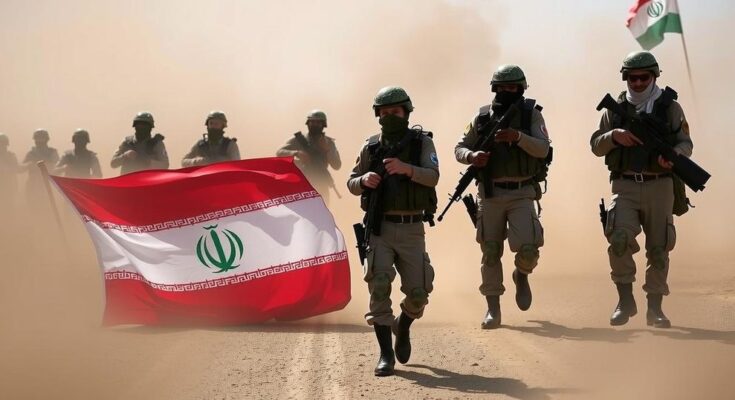The head of Iraq’s Popular Mobilization Units reaffirmed loyalty to Iran during a recent meeting, while Iranian-backed militias shift focus from Israel to Syria. Al-Fayyad paid tribute to late leaders Soleimani and al-Muhandis, acknowledging the PMU’s commitment to Iranian ties amidst regional changes. As the new Syrian leadership convenes with Iraqi officials, political leaders must navigate the implications of these shifts in power.
Recent statements from Faleh Al-Fayyad, the head of Iraq’s Popular Mobilization Units (PMU), reaffirm the group’s allegiance to Iran amidst a shifting regional focus. During a commemoration event in Diyala province, Al-Fayyad emphasized their commitment to Iranian leadership, particularly honoring the late General Qassem Soleimani, who was instrumental in combating ISIS. The PMU’s loyalty comes at a time when Iranian-affiliated militias are pivoting from their previous confrontations with Israel to address concerns regarding developments in Syria.
In conjunction with these declarations, the new Syrian leader, Ahmed al-Sharaa, met with an Iraqi delegation to discuss potential implications for regional stability. Hadi al-Amiri, head of the Badr Organization within the PMU, expressed that there exists a cautious optimism regarding Syria’s political transition but acknowledged the need for vigilance regarding its effects on Iraq. Meanwhile, Sunni leaders in Iraq harbor hopes that shifts in Syrian power dynamics may facilitate advancements for Sunni interests within their own country, while Kurdish leaders remain alert to the developments that may foster a unity government in eastern Syria.
The Iraqi Popular Mobilization Units (PMU) have historically maintained a strong alignment with Iran, influenced by Shiite solidarity following the rise of the Islamic State (ISIS). Established to counter ISIS’s incursion in Iraq, the PMU comprises various militias with ties to Iran, particularly following the assassination of General Qassem Soleimani, which deepened their association with Tehran. Recently, Iranian-backed militias have shifted their focus towards developments in Syria, a transformation signaling a potential change in their regional strategy.
The statements made by Faleh Al-Fayyad reflect the enduring influence of Iran on the PMU, as the group continues to prioritize its allegiance amidst evolving geopolitical landscapes. As Iraqi factions adjust their strategies in response to political developments in Syria, the dynamic between Iranian influence and local governance in Iraq remains pivotal. This interplay will undoubtedly shape Iraq’s internal politics and its relationships with neighboring regions moving forward.
Original Source: www.jpost.com




